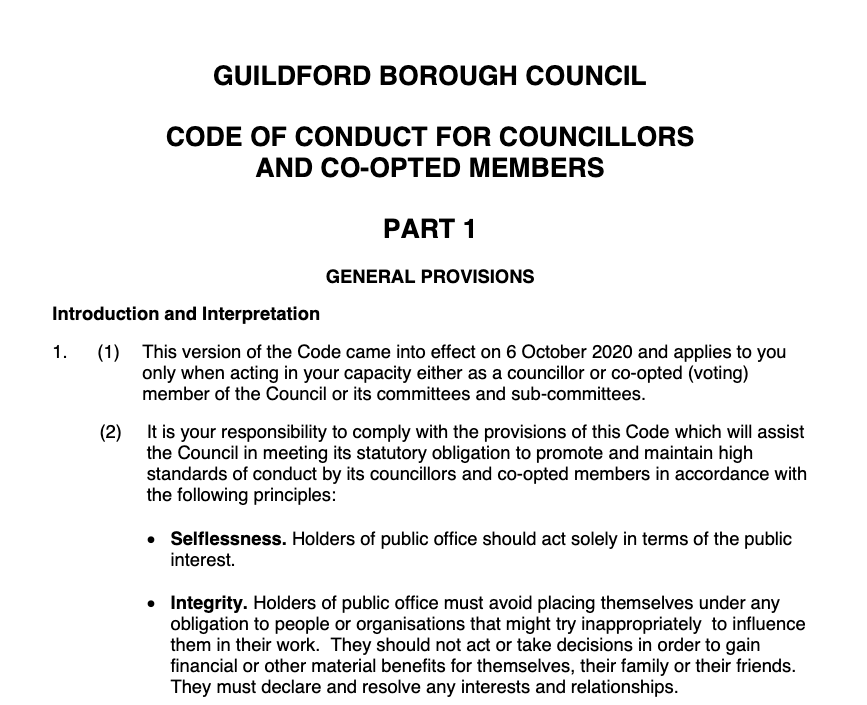 Abraham Lincoln
If given the truth, the people can be depended upon to meet any national crisis...
Abraham Lincoln
If given the truth, the people can be depended upon to meet any national crisis...
 Guildford news...
for Guildford people, brought to you by Guildford reporters - Guildford's own news service
Guildford news...
for Guildford people, brought to you by Guildford reporters - Guildford's own news service
Dragon Interview: Pt 1 – Council’s Complaints Process Is ‘Not Fit For Purpose’ – Says Retired Chief Exec
Published on: 1 Feb, 2023
Updated on: 23 Mar, 2023
 It is rare to get an insider’s objective view of the borough council, so we should really value this contribution from Bernard Quoroll, a retired solicitor living in Guildford, who was a senior figure in six local authorities.
It is rare to get an insider’s objective view of the borough council, so we should really value this contribution from Bernard Quoroll, a retired solicitor living in Guildford, who was a senior figure in six local authorities.
He speaks of what he found as someone who was part of the complaints process for some considerable time and shines a spotlight on the behaviour of councillors and council officials. His conclusion is that the process does not serve democracy well but he also explains why.
Mr Quoroll gives forthright answers to a series of questions that are vital in any discussions about local democracy. It’s a “long read” but those of us who care how it works, or why it doesn’t work, should read on…
Part One – The Problem
Interview conducted by Martin Giles
What is your background and your experience of local government?
I am a retired solicitor and mediator. I worked in six local authorities for over 30 years and was the chief executive of three of them.
I was Surrey County Council’s sole “Independent Person” (IP) for three years. I also acted as one of a number of IPs for all of the boroughs and districts in Surrey over a six-year period, which is now coming to an end. I have lived in Guildford since 1996. I am not a member or follower of any political party.
My relevant academic qualification is a Master’s Degree in Legal and Political Theory from University College London with a dissertation on “Integrity in Public Life”.
Explain the role of an Independent Person.
Complaints against councillors used to be dealt with by an independent national body called Standards for England. It employed trained investigators, adopted fair rules for deciding complaints and had significant powers to penalise councillors found to have behaved in breach of accepted standards. It also included a right of appeal to a judicial tribunal.
It was created in the year 2000 and abolished in favour of local adjudication only a few years later. Unsurprisingly, it was universally disliked by politicians, who regarded it as heavy-handed. It was certainly in need of reform after the first few years in operation, but the government of the day elected to throw the baby out with the bathwater.
…ask yourself which system is likely to give the public greater reassurance – a completely independent external body, or a locally based system which deals with complaints internally…”
The local adjudication system which replaced it is not independent, allows councils to write their own procedural rules and has ineffective mechanisms for calling to account councillors who are found to have behaved badly. Part of this new arrangement was the appointment of an Independent Person as someone the council is required to consult at various stages during the internal investigation of a complaint.
An IP is appointed by the council itself following a local advert. He or she is not required to have any specific qualification but is meant to be a kind of impartial, intelligent commentator who represents the public at large.
In my experience IPs are usually committed, thoughtful, independently-minded people who come from a variety of different backgrounds.
You may want to ask yourself which system is likely to give the public greater reassurance – a completely independent external body, or a locally based system which deals with complaints internally, has no external appeal process and incorporates a locally recruited IP with no specific qualifications or experience, performing only an advisory role.
And what is the role of an Independent Person in the complaints process specifically?
The precise role can vary in different councils because they can all adopt different procedures. An IP may be consulted at any stage during the process and will usually be consulted before a council decides whether to reject or investigate a complaint.
He or she will also usually be invited to attend an elected member “assessment meeting” of a complaint following investigation but typically is only given a brief opportunity to express a view and is not entitled to vote.
In practice, the degree of involvement of IPs can vary from council to council. IPs need to be assertive if they want to be effective in the role.
What were your observations? Without breaching confidentiality, can you give examples?
The key person in managing each council’s complaints process is called the monitoring officer (MO). They are usually senior, legally-qualified employees of the council. Some of the people I have worked with were not legally qualified and a few were not in my view sufficiently senior.
The most difficult cases are those involving senior councillors…”
In my experience, MOs do their jobs professionally, conscientiously and seek to be fair to both sides involved. (I have worked with an MO who seemed more interested in protecting the council and its elected members from criticism but that was an exception). By comparison, an IP is placed in a more passive capacity, waiting to be consulted.
The skills needed to fulfil the role well are typically those of a person with legal training.
Operating within procedural rules in compliance with principles of natural justice, investigating and recording evidence, writing accurate and unbiased reports to a high standard, analysing and challenging reports prepared by external investigators, understanding what is meant by the “balance of probabilities” test, understanding complex rights of free speech and the wider context of human rights and anti-discrimination legislation – all these things need a very specific skill set.
You also need to be senior enough within a council’s officer structure to have credibility. During most of my working life, I was my council’s MO in all but title. If councils are serious about responding to bad behaviour, they need to demonstrate that complaints are dealt with at the highest level, by someone with daily access to political leaders, not delegated to someone who may not have a seat on the board.
The most difficult cases are those involving senior councillors who are, by the nature of their roles, more likely to be called to account for what they say in public. They are already likely to be in close daily contact with their monitoring officers over a wide range of other day-to-day issues.
Complaints which are legitimate within a council’s code are often fiercely fought on both sides.”
In some situations, an MO might decide to declare a conflict of interest and find an MO from another council to manage the whole process. But even that has risks for an in-house MO, if a senior councillor feels let down by such a decision. I know of some MOs who have felt exposed and unsupported in their role, when dealing with complaints against senior members.
Complaints which are legitimate within a council’s code are often fiercely fought on both sides. A significant number of complaints are made by one councillor against another.
The dividing line between, say, political rhetoric and insulting a member of the public or another councillor can be a fine one. It can involve claims to freedom of speech, entitlements under human rights legislation or claims of discriminatory behaviour. It can sometimes feel as if the game has become as important as the issues under review.
Would you describe the process as open and trustworthy?
It is a very basic principle of English law and good administration that adjudicators must not only act fairly but be seen to act fairly. I do not think that the current local complaints system comes close to satisfying the second leg of that test. To reach that view, I do not have to make judgments about the trustworthiness of individuals.
The reasons why I say that the complaints system is not fit for purpose are:
a) Monitoring officers are required to critically examine the behaviour of their own employers. The decisions they take and the advice they give can potentially damage the reputation and interests of individuals who have power over their salaries, and prospects for advancement and who may be asked to give references in future. (Technically of course, officers are employed by a legal entity called the council, not individual members, but that does not always protect them from the personal or tribal emotions of elected people).
All officers who work in local government are trained by the nature of their jobs to show respect for and loyalty towards elected people. It can at times make them more reluctant or slower to call out bad behaviour.
It is a very basic principle of English law and good administration that adjudicators must not only act fairly but be seen to act fairly.”
It seems to me very unlikely that a member of the public making a complaint against a councillor is going to have confidence in a process which is managed by someone who is effectively employed by the person complained about and who has a personal loyalty to the organisation and the people within it.
b) If after a preliminary investigation, a detailed investigatory exercise is undertaken, sometimes by the MO or via a firm of solicitors and often by former self-employed monitoring officers. A report will be put before a committee of elected councillors, advised by the MO. The report may be made in public but the debate will usually be with the press and the public excluded. All the decision-makers will be elected by people from the same council.
In some councils, all the members of the committee will be from the same political party as the individual complained about. They may be his or her friends or political allies. In others, different parties may be represented by a mixture of political friends or foes. Individuals who regard themselves as too close may decide to declare a personal interest and recuse themselves.
No matter how hard those individuals try to act fairly (and in my experience they do try to do so conscientiously), neither a complainant nor the general public is likely to have much faith in such a process.
If a councillor is found to have behaved in an unacceptable way, a council has few effective ways of bringing that person to account.”
c) Any reassurance provided by an IP will be diluted by the varying knowledge and experience that each IP individually can bring to the table. They are offered a training day on the council’s adopted procedures but IPs who are not legally trained are typically less well-equipped to ask searching questions about the reliability of evidence or a wide variety of other legal issues which are part of the daily diet of those who have legal training. Nor will they always be able to avoid being inadvertently “managed” by a monitoring officer who will probably already have begun to reach a judgement about what the outcome should be.
None of these remarks are intended to call into question the good faith, integrity or conscientiousness of IPs or MOs.
There is a related technical issue which helps to illustrate my point. A councillor who is the subject of a complaint has a statutory right to seek the views of the IP in person after a complaint has been made against them but the person complaining does not have the same right!
The rules of natural justice require IPs to be impartial, to listen to both sides and not to show bias.
Appearances are as important as the reality. My practice has been to explain to the councillor in advance that I will meet them on the understanding that I will listen only and make a note of what they say and that anything I hear may be shared with the complainant and the assessment panel. Even that approach could be challenged legally. There is no justification for such an entitlement which appears to me to show favour to one party.
d) If a councillor is found to have behaved in an unacceptable way, a council has few effective ways of bringing that person to account. The council may censure an elected member, but many politically active councillors have thick skins. The subject member may be asked to give an apology but he or she can refuse to give one or seek to apologise in a way likely to cause further upset. He or she may be asked to undertake training but again the person complained of can refuse.
…complaints rarely lead to much more than a slap on the wrist…”
There is a range of other short-term inconveniences that can be imposed on councillors by a council and/or by a political group. But a council has no power to suspend the subject member, withdraw a financial allowance, impose financial penalties award compensation or pay a complainant’s costs.
In practice, a councillor found to have misbehaved may feel bruised, but complaints rarely lead to much more than a slap on the wrist and/or a passing notoriety. Even that can be diluted by the limited publicity arrangements that some councils adopt.
See also: Council’s Complaints Process Is ‘Not Fit For Purpose’ Pt 2 – How Do We Fix It?
See more articles relating to council complaints here.
Responses to Dragon Interview: Pt 1 – Council’s Complaints Process Is ‘Not Fit For Purpose’ – Says Retired Chief Exec
Leave a Comment Cancel replyPlease see our comments policy. All comments are moderated and may take time to appear.
Recent Articles
- Guildford Institute’s Crowdfunding Project for Accessible Toilet in its New Community and Wellbeing Centre
- Letter: Guildford – Another Opportunity Missed?
- Letter: GBC’s Corporate Strategy – Where Is the Ambition?
- My Memories of John Mayall at a Ground-breaking Gig in Guildford Nearly Six Decades Ago
- Westborough HMO Plans ‘Losing the Heart of the Street’ Says Resident
- College Invests to Boost Surrey’s Economy and Close Digital Skills Gap
- Community Lottery Brings Big Wins for Local Charities
- GBC Housing Plan Promises ‘A Vibrant Urban Neighbourhood’ Near Town Centre
- Hospital Pillows ‘Shortage’ at the Royal Surrey
- Updated: Caravans Set Up Camp at Ash Manor School


Recent Comments
- Ian Macpherson on Updated: Main Guildford to Godalming Road Closed Until August 1
- Sara Tokunaga on GBC Housing Plan Promises ‘A Vibrant Urban Neighbourhood’ Near Town Centre
- Michael Courtnage on Daily Mail Online Reports Guildford Has Highest-paid Council Officer
- Alan Judge on GBC Housing Plan Promises ‘A Vibrant Urban Neighbourhood’ Near Town Centre
- John Perkins on GBC Housing Plan Promises ‘A Vibrant Urban Neighbourhood’ Near Town Centre
- S Collins on GBC Housing Plan Promises ‘A Vibrant Urban Neighbourhood’ Near Town Centre
Search in Site
Media Gallery
Dragon Interview: Local Artist Leaves Her Mark At One of England’s Most Historic Buildings
January 21, 2023 / No Comment / Read MoreDragon Interview: Lib Dem Planning Chair: ‘Current Policy Doesn’t Work for Local People’
January 19, 2023 / No Comment / Read MoreA3 Tunnel in Guildford ‘Necessary’ for New Homes, Says Guildford’s MP
January 10, 2023 / No Comment / Read More‘Madness’ for London Road Scheme to Go Ahead Against ‘Huge Opposition’, Says SCC Leader
January 6, 2023 / No Comment / Read MoreCouncillor’s Son Starts Campaign for More Consultation on North Street Plan
December 30, 2022 / No Comment / Read MoreCounty Council Climbs Down Over London Road Works – Further ‘Engagement’ Period Announced
December 14, 2022 / No Comment / Read MoreDragon Interview: GBC Reaction to the Government’s Expected Decision to Relax Housing Targets
December 7, 2022 / No Comment / Read MoreHow Can Our Town Centre Businesses Recover? Watch the Shop Front Debate
May 18, 2020 / No Comment / Read More













Jules Cranwell
February 2, 2023 at 5:56 am
It has been my experience with GBC that complaints against councillors are a waste of time. The monitoring officer is too beholden to senior councillors to take any complaint seriously.
A valid complaint about the criminal fake barrister, Monika Juneja in 2014, was dismissed. She later was convicted of several crimes, at the Old Bailey, once the police were involved.
Other valid complaints concerning breaches of the councillors’ code of conduct by a council leader were dismissed out of hand by the MO, despite the evidence presented.